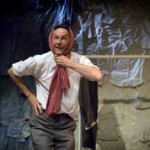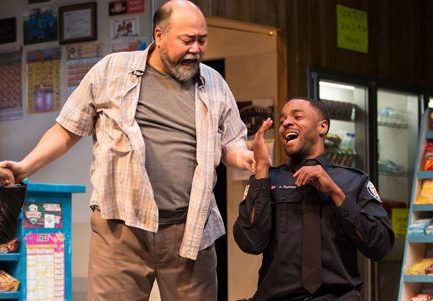A complex and valuable tale of surviving the horrors of war—at a price.
By Joel Benjamin
Mathew Zajac’s The Tailor of Inverness, a one-man tour de force by the playwright/actor, delves deeply into the consequences of duplicity and failure to face the truths of one’s life. These consequences reverberate down the family tree. That Tailor involves his own family, makes Mr. Zajac’s play—and performance—all the more powerful and brave.
The title character, Mathew wound up in that profession in that Scottish town after much suffering during World War II involving a peregrination that took him through thousands of miles of Eastern Europe, the wilds of eastern Russia, Persia, northern Africa and Italy, witnessing atrocities, inhumanity and even kindness.
Zajac’s command of accents and his quicksilver donning and doffing of eyeglasses and bits of period clothing kept the story flowing as if there were a cast of dozens. The voice Magdalena Kaleta recited Polish poetry and represented the females in his life.
The story begins innocently enough with the Tailor’s pleasant tale of his work history in Scotland, the country that took him in and the country in which he married and made a family. Things get darker as the story shifts to Poland at the beginning of the War.
The details are harrowing and his suffering extensive, so that his pleasant life in Scotland appears to be his just reward. That is, until his son, the playwright, discovers what actually happened and what his father conveniently—perhaps, justifiably—failed to mention. This includes the existence of a daughter, the author’s half-sister, and the betrayals of friends and loved ones amidst a desperate, defenseless population forced into showing their darkest sides. Jews were slaughtered and neighbor struggled against neighbor as their section of Poland, Galicia, kept switching from Polish to Ukrainian to Russian domination as the War swirled around them.
Escaping Poland he reached Uzbekistan where he was forced into communal farming, nearly starving to death in the process. He joined up with fellow Poles en route to fight the Nazis, detouring through Iraq, Syria and eventually falling in with the British in Egypt, winding up in this circuitous way in Inverness, Scotland where the narration began.
Subtitled, “a play for an actor and a violinist,” Mr. Zajac must have thought the violinist, skillfully embodied by Aidan O’Rourke, somehow made his play more meaningful. In fact, Mr. O’Rourke’s presence was a slightly pretentious distraction. Even though the music he played (by Jonny Hardie & Gavin Marwick) created mood and a few appropriate sound effects, he was neither here nor there as a character, just a body on the stage making lovely music.
Ali Maclaurin’s evocative set featured a back wall covered, every square inch, in pale, starched pieces of clothing that extended down along the floor. The clothing served as a screen for Tim Reid’s visuals which most notably included a series of maps upon which colored lines indicated the sojourns of Zajac, Sr. as well as lines of poetry, English translations of Polish dialogue—used sparingly—and some eerie period photos. A tailor’s dummy, occasionally recruited as a stand-in for a female character, was on one side and a large tailor work table, covered with scissors, needles, thread and half-made items of clothing dominated the other.
Mr. Zajac’s detailed writing and acting, shaped by director Ben Harrison, turned the tiny performance space upstairs at 59E59 into a colorful little universe. This skillfully and effectively told tale is a gift, a brilliant gift in a time when stories of the upheavals of World War II are fast fading into generic history.
*Photos: Tim Morrozzo
The Tailor of Inverness (through May 3, 2015)
59E59 Theaters 59 East 59th St. (between Madison and Park Avenues) New York, NY
Tickets: 212-279-4200 or www.ticketcentral.com
Information: www.59E59.org
Running time: One hour 20 minutes, no intermission

























